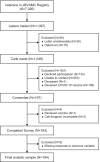An assessment of Veterans attitudes and willingness to receiving the COVID-19 vaccine: a mixed methods study
- PMID: 35351029
- PMCID: PMC8961481
- DOI: 10.1186/s12879-022-07269-7
An assessment of Veterans attitudes and willingness to receiving the COVID-19 vaccine: a mixed methods study
Abstract
Background: While several safe and effective COVID-19 vaccines have been available since December 2020, many eligible individuals choose to remain unvaccinated. This vaccine hesitancy is an important factor affecting our ability to combat the COVID-19 pandemic.
Methods: The objective of the study was to examine the attitudes and willingness among US Veterans toward receiving COVID-19 vaccination. The study used a quantitative qualitative mixed methods design with a telephone survey and then in-depth interviews in a subset of those surveyed. Participants were unvaccinated Veterans (N = 184) selected randomly from a registry of patients who had received VA healthcare during the pandemic and had a diagnostic test for COVID-19. The primary outcome was willingness to accept COVID-19 vaccination. Survey data collection and in-depth interviews were conducted by telephone. Analyses of the survey data compared the primary outcome with demographics, clinical data, and survey responses using bivariate and multiple regression analyses. A subset (N = 10) of those surveyed, participated in an in-depth interview. Interview transcripts were analyzed to derive themes using qualitative content analysis.
Results: Almost 40% of participants disagreed they would receive a COVID-19 vaccine. Participants who were younger, female, and had fewer comorbid conditions were more likely (P < 0.05) to disagree with COVID-19 vaccination. In multiple regression analysis, willingness to accept vaccination was associated with reliance on a doctor or family member's recommendation and with a belief that vaccines are effective. In-depth interviews revealed several barriers to COVID-19 vaccination, including lack of trust in the government and vaccine manufacturers, concerns about the speed of vaccine development, fear of side effects, and fear the vaccine was a tool of racism.
Conclusions: This study illustrates the complexity of patients' deliberation about COVID-19 vaccination and may help physicians and other health care providers understand patients' perspectives about COVID-19 vaccination. The results highlight the importance of patients' trust in physicians, healthcare organizations, pharmaceutical manufacturers and the government when making health decisions.
Keywords: Acceptance of healthcare; Qualitative Research; Survey Research; Trust in healthcare; Vaccine Hesitancy; Veterans.
© 2022. The Author(s).
Conflict of interest statement
The authors have no conflicts of interest to disclose.
Figures
References
MeSH terms
Substances
LinkOut - more resources
Full Text Sources
Medical


